By Jordan Rowe Barrett, Tom Testa
Last week, 150 change makers from across the spectrum of health data and information technology gathered in St. Louis for our three-day 2024 conference: The Future of Trust in Health. Attendees were eager to get to work, discussing key issues and making connections that will foster access, privacy, and interoperability.
On Sunday, Sept. 22, conference attendees arrived from across the country to the Hilton St. Louis at the Ballpark, nestled a block away from the iconic St. Louis Arch. With palpable excitement, we gathered for a reception to enjoy food, drinks, and the musical backdrop of lively dueling pianos.
An unmistakable recurring theme throughout the conference was the human aspect of healthcare – more specifically, that we are all humans, and we are all patients. Our speakers reminded us of a sobering bottom line: At its core, our efforts to advance trust in healthcare are efforts to keep people safe and improve outcomes for all.
If you were unable to join us this year, read on for a recap of #DirectTrust2024.
Day 1: Monday, September 22
On the first day of the conference, President and CEO Scott Stuewe opened with a thought-provoking welcome address, comparing the healthcare industry to a Gordian knot, with levels of complexity and competing priorities entangled into one ecosystem that ultimately thrives through collaboration.
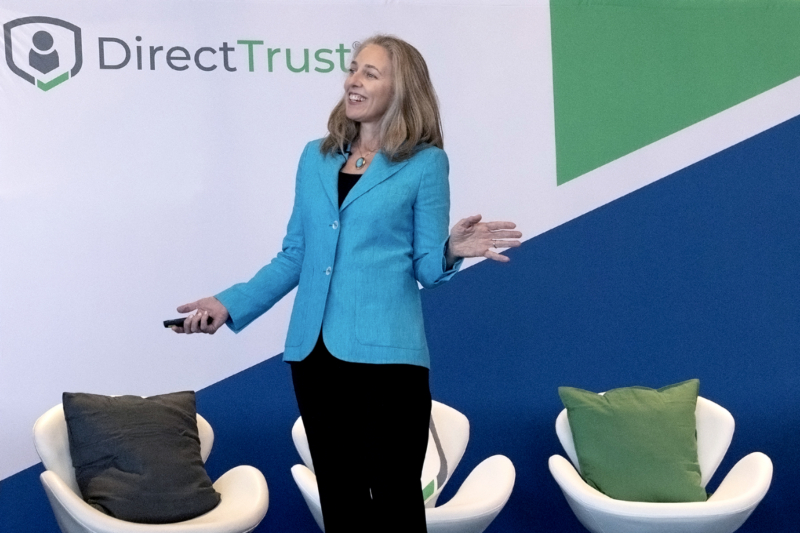
The first keynote of the 2024 annual conference was author and former Chief Technology Officer of the U.S. Department of Health and Human Services, Susannah Fox. Susannah had our full attention as she shared stories of patient “rebels” who, when failed by the system, took accessing their critical health information into their own hands. She shared a matrix which illustrated levels of visibility vs. met needs among patient groups in the mainstream healthcare system. Fox inspired us all to empower patients, especially those who fall to the bottom left quadrant of “Invisible; Needs Not Met,” to self-advocate, and to ultimately challenge the status quo in partnership with the rebels.
Micky Tripathi, Assistant Secretary for Technology Policy, spoke next, giving an overview of the recent reorganization of the Office of the National Coordinator for Health IT, and detailing the some of the implications of new regulatory frameworks and ASTP initiatives. Tripathi closed with a call for engagement from stakeholders across the healthcare ecosystem to help identify regulatory needs around AI in healthcare, and by highlighting our new latest collaboration with The Sequoia Project to deploy an infrastructure to support widespread adoption of TEFCA for a more connected healthcare system
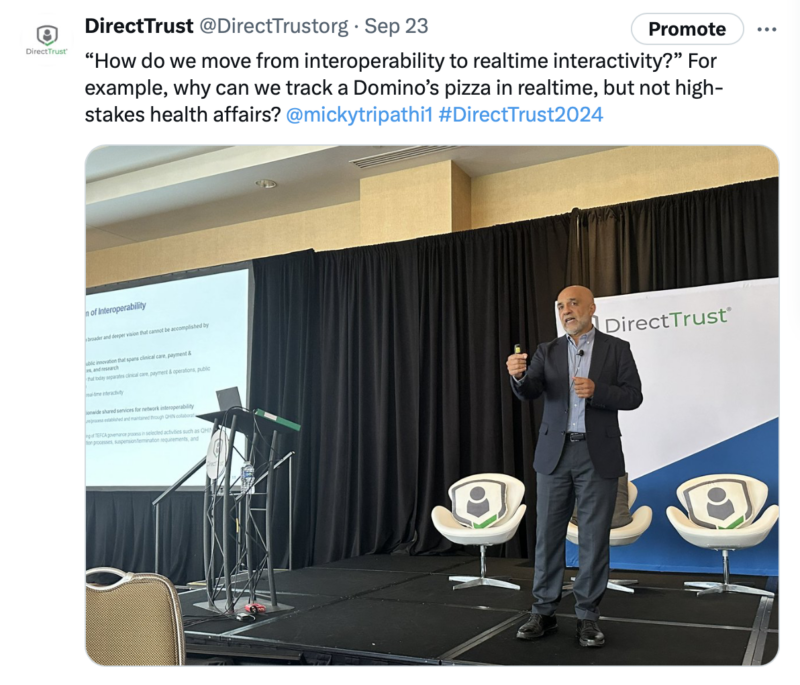
The morning’s Advocacy Panel, moderated by Susan Clark, Senior Director of Program Development, featured Nora Cox (Texas e-Health Alliance), Jodi Daniel (Crowell & Moring), and Doug Peddicord (Washington Health Strategies). Our panelists discussed the implications of state and federal policy on health IT regulation and advancement, answering questions about the upcoming election and sharing insights from their efforts to shape policy.
A highly anticipated highlight of our Monday line-up was the afternoon’s debate on Consumer Mediated Exchange. Participants Lisa Bari (Civitas Networks for Health) and Paul Wilder (CommonWell Health Alliance) – the negative team; and Ryan Howells (Leavitt Partners) and Marc Mar-Yohana (OtisHealth) – the affirmative team, were asked to debate the proposition, “Digital credentials have the strong potential to significantly improve the performance of individual access to health access.”
The panelists engaged in a lively, respectful verbal spar, with the affirmative displaying support and optimism around technological advancements on the horizon, and negative leading with concern about the validity of and trustworthiness of digital credentials and if they would ultimately affect the patient experience.
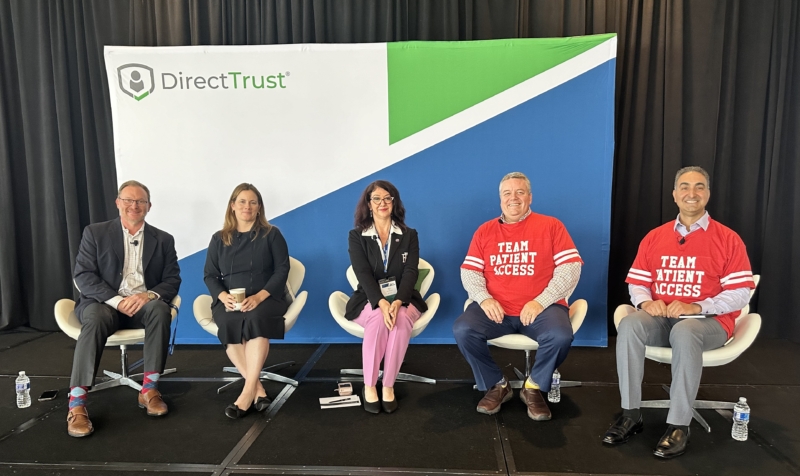
A key point made by Howells resonated with attendees: “Identity is not only a healthcare problem, it affects all industries. To solve the problem in healthcare, we need to consider what other industries are doing.” The theme of patient-centered problem solving was solidified during final arguments: patients are the only constant in healthcare and ultimately, identity should live with the individual patient.
After a full day of sessions, including afternoon breakouts on Standards Consensus Bodies, caregiver connectivity, and privacy breach management, and a 360X and Directory demo session, we decided to have some fun at whimsical City Museum. Attendees enjoyed dinner and drinks while exploring intricate exhibits including caves, slides, swings, ladders, secret hideaways and more. What a day!
Day 2: Tuesday, September 23
Kathryn Ayers Wickenhauser, Chief Strategy Officer, opened our second day with a recap of Monday’s packed agenda, summarizing a preliminary conference takeaway: “There’s so much opportunity here – we are all inspired to advance the future of trust in health.”
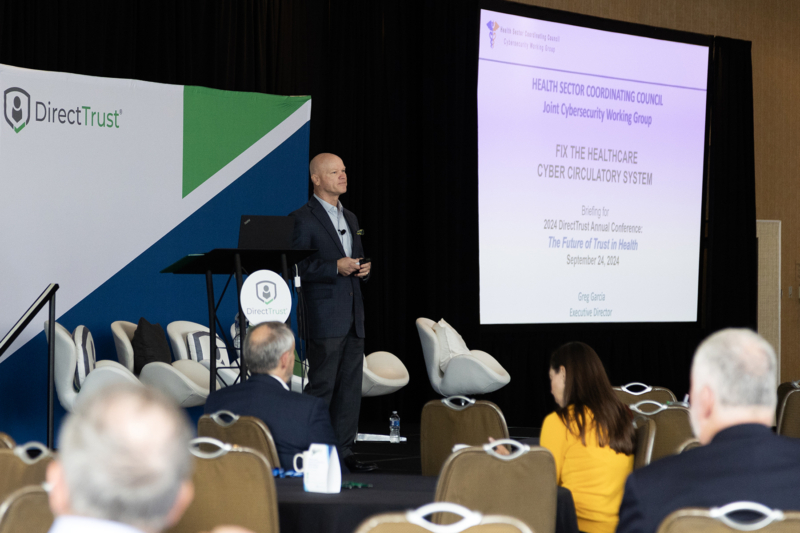
The indisputable theme for Tuesday’s agenda was emerging technologies and cybersecurity. We welcomed Jessica Hauflaire of Digital Therapeutics Alliance to the morning’s Main Stage to announce our partnership to establish and release new accreditation criteria for Digital Therapeutics. The criteria is now open for public comment.
Our morning general session featured our third and final 2024 keynote speaker, Greg Garcia, Executive Director at the Health Sector Coordinating Council Cybersecurity Working Group. Garcia outlined the risks of and opportunities around cybersecurity in the healthcare ecosystem. His engaging presentation included an overview of the Health Sector Coordinating Council (HSCC) Cybersecurity Working Group, what they do, and how they execute their objectives to advance security, risk assessment and response.
Garcia presented a collection of niche points for consideration around cybersecurity regulation, from aged out medical devices to supply chain risk management to legacy technology security. He outlined HSCC’s five-year objectives and the entity’s plan for addressing critical issues across healthcare sectors.
The patient-centered theme continued to resonate: “We are all patients. Cyber safety is patient safety.”
Another highlight of Tuesday’s agenda was the CISO Roundtable and Panel sessions. The Roundtable used Chatham House Rule which states:
When a meeting, or part thereof, is held under the Chatham House Rule, participants are free to use the information received, but neither the identity nor the affiliation of the speaker(s), nor that of any other participant, may be revealed.
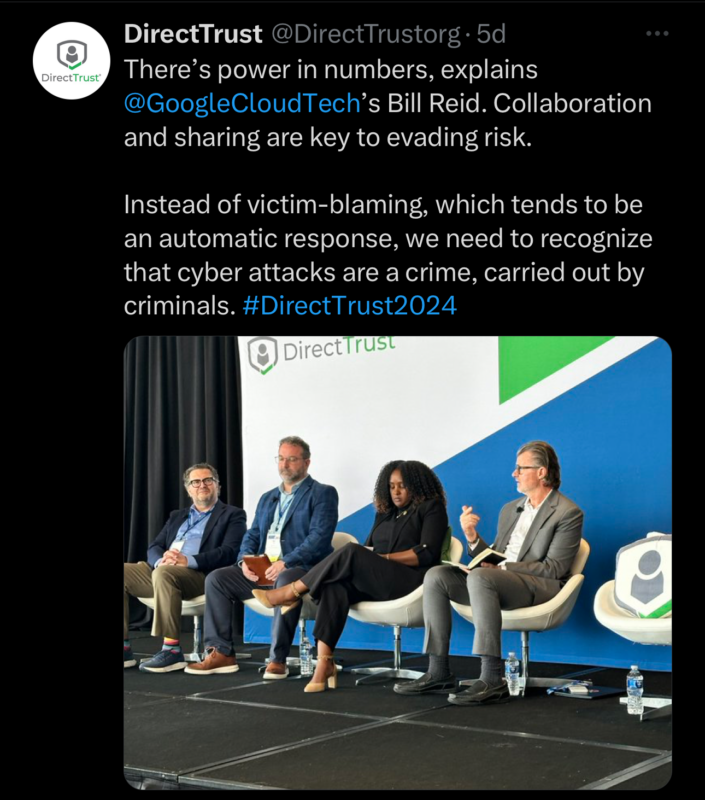
This format allowed for secure facilitated dialogue about information security, and a safe space for participants to share their experience with security breach response and lessons learned. The Panel served as a follow-up discussion among our four CISOs – Joseph Davis (Microsoft), Mike Green (Availity), Bill Reid (Google Cloud), and Bezawit Sumner (CRISP Shared Services) – who shared specific instances of security threats and data theft and considerations for response, action and recovery from an attack. The conversation focused on the importance of concise communication with employees, external stakeholders, and patients. The group also highlighted the importance of organization-wide resiliency in preparation for a cyberattack, and collaborative post-action assessment to improve upon the inevitable next threat.
The takeaway? Identity and access management are critical.
Tuesday’s breakout sessions took us in-depth on the topics of AI, cybersecurity, and Direct Secure Messaging. Our afternoon speakers delivered unique, thought-provoking, cross-sector use cases, and inspired actionable takeaways.
Day 3: Wednesday, September 24
We spent the first two days of the conference absorbing knowledge and making connections. The final day was for final “aha!” moments and a closing call-to-action. Following a day two recap, we heard a virtual message from Alex Mugge, Directory and Chief Health Informatics Officer at Centers for Medicare and Medicaid Services. Alex shared about ongoing work to advocate for Directories. She emphasized burden reduction for providers and payers through streamlining healthcare processes through technology and standards.
Mugge introduced a CMS pilotproject with the state of Oklahoma to develop a directory that will inform the design and feasibility of a future national directory of healthcare. This “single source of truth” would reduce administrative costs and enhance data reliability. She concluded by highlighting the need for collaboration across the healthcare industry to address these challenges and improve the healthcare system.
The morning panel, “What’s Next for the Future of Trust in Health,” facilitated a discussion among panelists on just that. Muhammad Chebli (NextGen), Debbie Condrey (eHealth Exchange), Michael Marchant (Sutter Health), and Katherine Lusk (Texas Health Services Authority) shared their thoughts on how we can take insights gained from the last three days and transform them into real-world action.
Our final breakout sessions and workshops encouraged engagement in advocacy work, outlined the Five Rights of Secure Health Data, and instructed on the use of digital identity services, facilitating our final moments of community and connection before adjourning.
Kathryn Ayers Wickenhauser concluded our conference with an inspiring call to action, urging attendees to take the insights, energy, and collaboration from the week and turn them into real-world change. She emphasized the vital role of trust, highlighting the “networkers” who build connections, the “solvers” who push for seamless solutions, the “champions” who center patient care, and the “seekers” who challenge the status quo.
We reflected on how the conference fostered opportunities to collaborate, urging everyone to embrace emerging technologies like AI to work smarter and more efficiently. She called on participants to continue forming meaningful connections, offer feedback, and help shape the future of our organization, transitioning from a focus solely on interoperability to a broader emphasis on “Team Trust,” aligning with our mission to foster trust in health information exchange.

Throughout the conference, we received positive feedback about the quality and caliber of attendees and speakers – high praise to all who made the trip to St. Louis this year. This was an impressive group, and we are grateful to everyone who joined us and contributed to the collaborative and respectful atmosphere.
Thank you, especially, to our sponsors, who made every aspect of the event – from networking breaks (and great snacks) to coffee to specific sessions, lanyards and more – possible. We are already looking forward to next year’s event: Save the date and join us back in St. Louis on August 4- 7!
Jordan Rowe Barrett is Communications Strategist for DirectTrust and Tom Testa is Vice President at Anderson Interactive.
